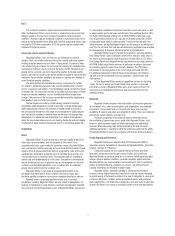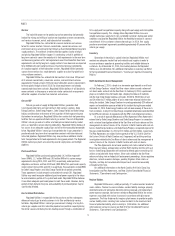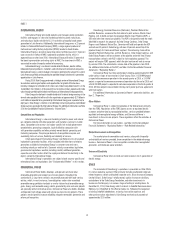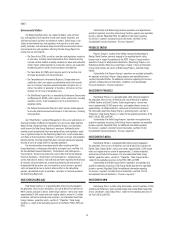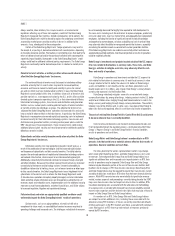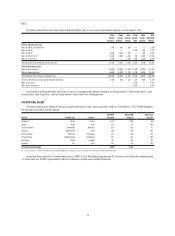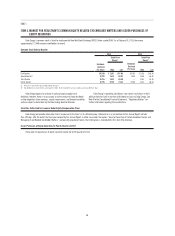Duke Energy 2014 Annual Report Download - page 36
Download and view the complete annual report
Please find page 36 of the 2014 Duke Energy annual report below. You can navigate through the pages in the report by either clicking on the pages listed below, or by using the keyword search tool below to find specific information within the annual report.
PART I
16
period and may further increase costs. Thus, the Dan River ash basin release
could have an adverse impact on the reputation of the Duke Energy Registrants
and their fi nancial position, results of operations and cash fl ows.
The Duke Energy Registrants are subject to numerous environmental laws
and regulations requiring signifi cant capital expenditures that can increase
the cost of operations, and which may impact or limit business plans, or
cause exposure to environmental liabilities.
The Duke Energy Registrants are subject to numerous environmental
laws and regulations affecting many aspects of their present and future
operations, including coal combustion residuals (CCRs), air emissions, water
quality, wastewater discharges, solid waste and hazardous waste. These laws
and regulations can result in increased capital, operating and other costs.
These laws and regulations generally require the Duke Energy Registrants to
obtain and comply with a wide variety of environmental licenses, permits,
inspections and other approvals. Compliance with environmental laws and
regulations can require signifi cant expenditures, including expenditures for
cleanup costs and damages arising from contaminated properties. Failure to
comply with environmental regulations may result in the imposition of fi nes,
penalties and injunctive measures affecting operating assets. The steps the
Duke Energy Registrants could be required to take to ensure their facilities
are in compliance could be prohibitively expensive. As a result, the Duke
Energy Registrants may be required to shut down or alter the operation of
their facilities, which may cause the Duke Energy Registrants to incur losses.
Further, the Duke Energy Registrants may not be successful in recovering
capital and operating costs incurred to comply with new environmental
regulations through existing regulatory rate structures and their contracts with
customers. Also, the Duke Energy Registrants may not be able to obtain or
maintain from time to time all required environmental regulatory approvals
for their operating assets or development projects. Delays in obtaining any
required environmental regulatory approvals, failure to obtain and comply
with them or changes in environmental laws or regulations to more stringent
compliance levels could result in additional costs of operation for existing
facilities or development of new facilities being prevented, delayed or subject
to additional costs. Although it is not expected that the costs to comply with
current environmental regulations will have a material adverse effect on the
Duke Energy Registrants’ fi nancial position, results of operations or cash fl ows
due to regulatory cost recovery, the Duke Energy Registrants are at risk that
the costs of complying with environmental regulations in the future will have
such an effect.
The EPA has recently enacted or proposed new federal regulations
governing the management of cooling water intake structures, wastewater and
carbon dioxide (CO2) emissions. These regulations may require the Duke Energy
Registrants to make additional capital expenditures and increase operating and
maintenance costs.
Duke Energy’s investments and projects located outside of the U.S. expose
it to risks related to the laws, taxes, economic and political conditions, and
policies of foreign governments. These risks may delay or reduce Duke
Energy’s realization of value from its international projects.
Duke Energy currently owns and may acquire and/or dispose of material
energy-related investments and projects outside the U.S. The economic,
regulatory, market and political conditions in some of the countries where
Duke Energy has interests may impact its ability to obtain fi nancing on
suitable terms. Other risks relate to its customers’ ability to honor their
obligations with respect to projects and investments, delays in construction,
limitations on its ability to enforce legal rights, and interruption of business,
as well as risks of war, expropriation, nationalization, renegotiation, trade
sanctions or nullifi cation of existing contracts and changes in law, regulations,
market rules or tax policy.
OPERATIONAL RISKS
The Duke Energy Registrants’ results of operations may be negatively
affected by overall market, economic and other conditions that are beyond
their control.
Sustained downturns or sluggishness in the economy generally affect the
markets in which the Duke Energy Registrants operate and negatively infl uence
electricity operations. Declines in demand for electricity as a result of economic
downturns in the Duke Energy Registrants’ regulated electric service territories
will reduce overall sales and lessen cash fl ows, especially as industrial
customers reduce production and, therefore, consumption of electricity. Although
the Duke Energy Registrants’ regulated electric business is subject to regulated
allowable rates of return and recovery of certain costs, such as fuel, under
periodic adjustment clauses, overall declines in electricity sold as a result of
economic downturn or recession could reduce revenues and cash fl ows, thereby
diminishing results of operations. Additionally, prolonged economic downturns
that negatively impact the Duke Energy Registrants’ results of operations and
cash fl ows could result in future material impairment charges to write-down
the carrying value of certain assets, including goodwill, to their respective fair
values.
The Duke Energy Registrants also sell electricity into the spot market or
other competitive power markets on a contractual basis. With respect to such
transactions, the Duke Energy Registrants are not guaranteed any rate of return
on their capital investments through mandated rates, and revenues and results
of operations are likely to depend, in large part, upon prevailing market prices.
These market prices may fl uctuate substantially over relatively short periods
of time and could reduce the Duke Energy Registrants’ revenues and margins,
thereby diminishing results of operations.
Factors that could impact sales volumes, generation of electricity and
market prices at which the Duke Energy Registrants are able to sell electricity are
as follows:
• weather conditions, including abnormally mild winter or summer
weather that cause lower energy usage for heating or cooling purposes,
respectively, and periods of low rainfall that decrease the ability to
operate facilities in an economical manner;
• supply of and demand for energy commodities;
• transmission or transportation constraints or ineffi ciencies that impact
nonregulated energy operations;
• availability of competitively priced alternative energy sources, which
are preferred by some customers over electricity produced from coal,
nuclear or gas plants, and customer usage of energy-effi cient equipment
that reduces energy demand;
• natural gas, crude oil and refi ned products production levels and prices;
• ability to procure satisfactory levels of inventory, such as coal, gas and
uranium; and
• capacity and transmission service into, or out of, the Duke Energy
Registrants’ markets.
Natural disasters or operational accidents may adversely affect the Duke
Energy Registrants’ operating results.
Natural disasters (such as electromagnetic events or the 2011 earthquake
and tsunami in Japan) or other operational accidents within the company or
industry (such as the San Bruno, California natural gas transmission pipeline
failure) could have direct signifi cant impacts on the Duke Energy Registrants as
well as on key contractors and suppliers. Such events could indirectly impact
the Duke Energy Registrants through changes to policies, laws and regulations



